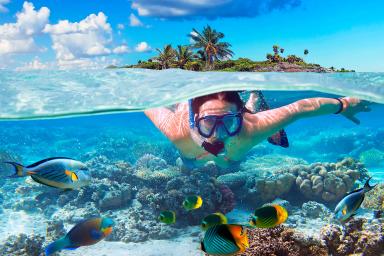Tourism fairs
The tourism sector includes hospitality, catering, transportation and other tourism-related companies, understood as travel and stays undergone by people in places other than their usual environment for leisure, business or other reasons. Tourism is one of the activities that produces the greatest economic flow, both in the sending and receiving areas, with an impact on employment, production, income distribution, balance of payments, public investments, etc., in addition to cultural effects.

1Event found

The tourism sector
The Spanish geography has great landscapes and tourist destinations that are the attraction for millions of foreign tourists a year, as well as for national tourists. Around this fact, a large network of tourist companies and services has been created, making this sector the most important in the economic and social panorama of the country.
Despite the fact that national tourism is associated with the mythical "sun and beach" of the sixties, for years now interior and urban tourism has been more encouraged, giving prominence to the cultural wealth of each of the regions. The sector includes, in turn, other sub-sectors that provide a livelihood for many families and businesses in the country.
Internationalization
The country's tourism companies have known how to look beyond and have found new business opportunities in the foreign market. The internationalization of these companies is mainly focused on the hotel sector, which has begun to expand throughout the Asian continent, leaving behind traditional markets such as the Caribbean or other European countries.
This fact denotes a great capacity for global action on the part of tourism professionals.
Today, Spain is a mature sector that is attracting more and more tourists with greater purchasing power, who are looking for a comprehensive experience of leisure, culture, gastronomy and shopping in a safe environment. It is now a question of investing in adding value to the customer experience to differentiate it from other countries.
Digital tourism
Users are increasingly using the online environment to search for their trip and also from mobile devices, which is why tourism companies must adapt their websites to this new form of search and purchase.
Selling online is here to stay and this process must be easy, fast and, above all, safe. In this sense, the sector has been making an effort for years to integrate new technologies into their ways of doing things, from selling a travel package, to offering experiences and engaging users through social networks.
Social networks are the point of contact with users and, therefore, online reputation must be very careful. Users base their purchase decisions on comments and references from other customers and, in this sense, having a presence in forums and following up on what is being said about a certain tourism company is a mandatory activity and fundamental for the proper functioning of any business, as it gives them clues to improve and offers an objective view of their positioning.
Sustainable tourism
The main challenge facing tourism is sustainability. Tourism activity leads to the massification of spaces in cities, towns, beaches and natural landscapes, which leads to an increase in carbon dioxide emissions, excessive water and energy consumption and waste generation.
In this sense, in order to take care of the environment, tourism companies are already integrating strategies and reaction measures into their projects so that tourism does not become a problem for the care and respect of the environment.
Tourism Fairs at IFEMA MADRID
In IFEMA MADRID we have the largest tourism fair in Madrid and internationally. This is Fitur, an event that has been growing and evolving in parallel with the tourism sector. We also have the observatory Fitur Next and the Fair of Nature and Sustainable Tourism, Expotural.









